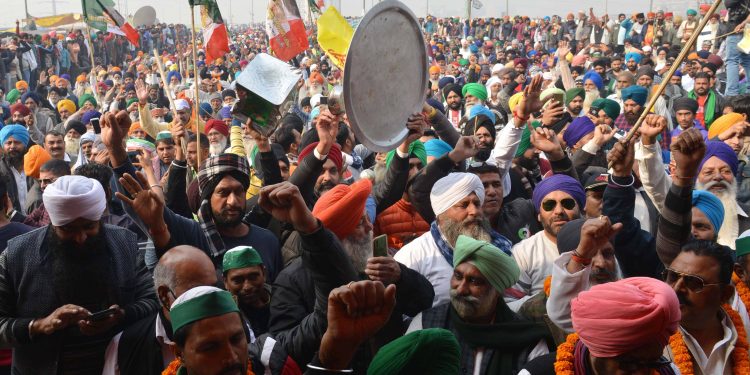Prime Minister Narendra Modi sought to kill two targets – the ongoing farmers’ agitation and Bengal Chief Minister Mamata Banerjee – with one swipe in his much-awaited interaction with farmers at a virtual event on 25 December. The exercise, however, showed a deplorable lack of urgency on the part of the Union government to end the stalemate in the farmers’ agitation. He appeared to have turned the virtual meeting into an election campaign for the BJP in Bengal which is going to polls a few months from now. PM Modi was more focused on hitting out at Bengal CM Mamata Banerjee rather than finding ways out of the farmers’ impasse. BJP leadership has been accusing the Opposition of ‘misleading’ the farmers. PM Modi too followed the same route.
PM Modi announced the release of the next installment of PMKSN (Pradhan Mantri Kisan Samman Nidhi) amounting to Rs 18,000 crore to 9 crore small and marginal farmers. This big amount boils down to a pittance as the scheme’s allotted money of Rs 6,000 per annum for each farmer is a measly Rs 500 per month. The announcement had all the usual theatrics associated with the PM’s style of functioning. But, on the all-important issue of the farm laws, he merely repeated the government’s readiness to talk things over with the farmers. There was not a word on the farmers’ demand for repeal of the laws. Nor did he explain the government’s position on the Supreme Court’s suggestion of putting the laws on hold till a solution to the imbroglio is found. Though the farmers have agreed to resume talks with the government, they have made it clear they want the modalities for repealing the laws to be worked out.
The government finds itself in the grip of the worst crisis so far in its anxiety to help its friends in the corporate world itching to open the agriculture market which, they have realised now, holds a huge financial potential in India. Exploiting farmers is only collateral damage for the corporates. This government has weathered previous crises by either shifting the focus from the contentious issues to the Congress-led Opposition or whipping up communal and anti-Pakistan hysteria. But this strategy is not working with the farmers who can’t be swayed by communal rhetoric nor will people in general accept the label that the agitating farmers are all Khalistanis. To wriggle out of the mess, the Union government has been resorting to denigrating the farmers and trying to break their unity. But both attempts have till date failed to yield any result.
The reason for which the agitating farmers have not been divided is very simple. Their demand has only one single point. That point is unconditional and total withdrawal of the three controversial farm bills. This has left no elbow space for the government to carry out any divisive tricks such as accepting chosen demands of different groups. This singular demand has definitely been cleverly thought out by the farmer leadership out of sheer experience of watching the Modi government play out various theatrics during past agitations. This is probably the only people’s movement that has managed to trickle down to the grass roots against the present government. It is, therefore, imperative for the Centre to not make these farm laws an issue of prestige.
The image of PM Modi as a strong and resolute leader will not get watered down if the farmers’ demand is met. Rather, Modi’s image will be further bolstered as a true democrat who governs with compassion. Apart from the opportunity of gaining further support from the farmers which will far exceed the 38 per cent voter base that the BJP enjoys today, it will also create a favourable image internationally for Modi. To think that the PMKSN money will win over other farmers nationwide is far from truth. It must also be kept in mind and this has been proven by history that disenchantment among farmers affects social well being which in turn creates economic crises. India being an agricultural economy, this may spell doom.







































